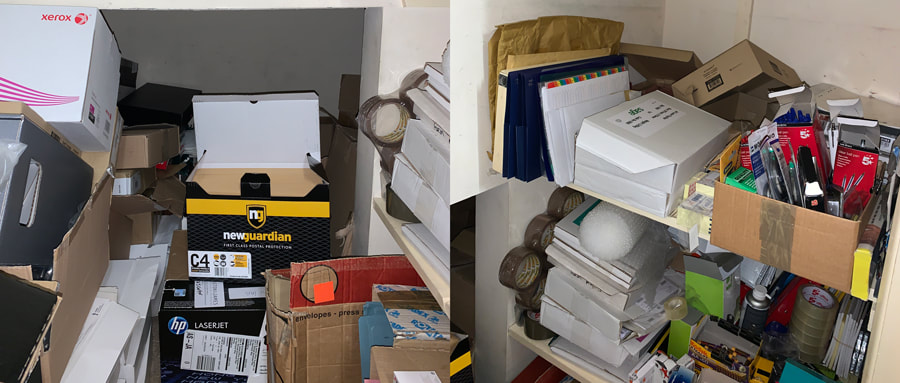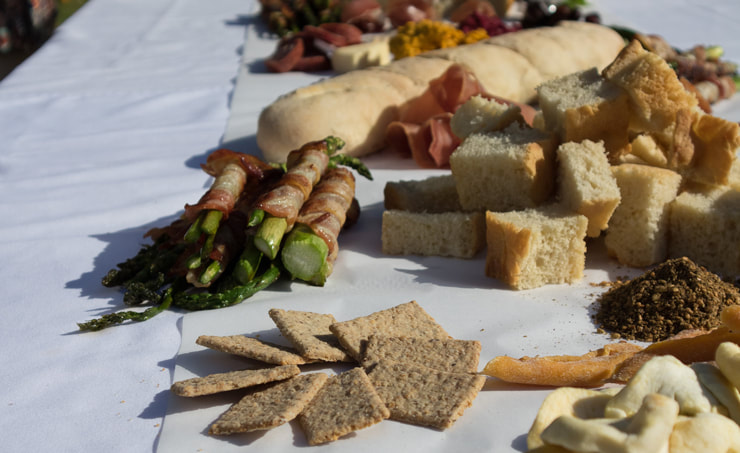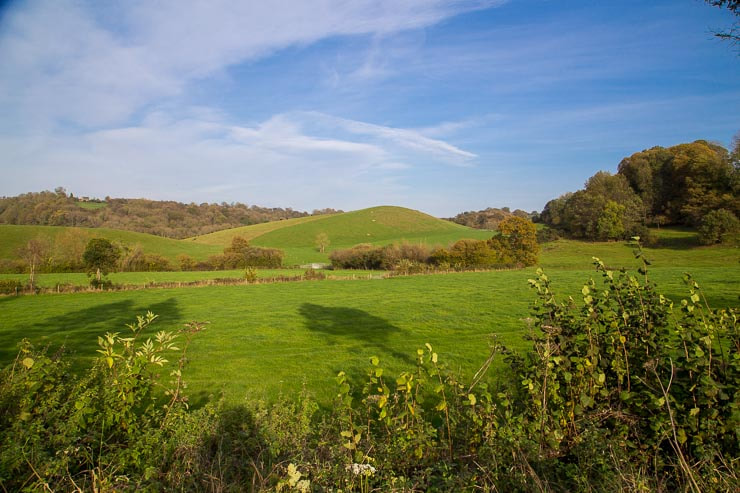|
If you were to visit me in my office you would see a tidy desk, an efficient filing system and a clean room. I hope it would be a welcoming, yet professional, environment where you would feel at home and confident in my ability as an accountant.
In fact, I could take you round the rest of the office and generally it's clean, neat and tidy. But there is one door and behind it is the stationery cupboard. Opening the door and stepping into the cupboard is not for the faint hearted. It's a mess. Whenever anyone goes into it they search for what they need by pulling things out of boxes, piling them on top of other things, leaving them on the floor and there they remain once the required item has been located. As you can see from the picture, it's not a real room but only the space under the stairs. There's a lot of history in that cupboard: A3 paper with sixteen ruled columns - long replaced by spreadsheets, Tippex now replaced with the backspace or delete buttons, paperclips, staples, typrewriter ribbons, dictation tapes all archaic and no longer useful or functional. Old boxes and packaging material which, of course, might be useful - one day! What it needs is for everything to be pulled out, sorted and mostly thrown away. Then, what we use regularly could be put back (tidily) and we would all be able to see what we needed at a glance. The area right at the back of the cupboard, the part way out of reach under the stairs should be closed off to prevent further generations of junk being stored (in the hope that one day it might be useful). Will we ever get round to it? I doubt it - we've not done so in the thirty years I've been there and we're too busy to even begin to think about doing it. My point? I think there is the equivalent of my stationery cupboard lurking somewhere in the depth of our heart. A part of our heart that is behind a closed door which looks good from the outside. It's a door we don't want to open and certainly somewhere we are not particularly keen on sorting out. As with my stationery cupboard, there may be some things that could be useful but we can't seem to locate them because of all the debris that surrounds them. There is only one way for us to sort out the stationery cupboard of our heart and that is to be brave enough to open the door and begin to look at what is there. Then take it all out and ask a question: "Why is this here?" In some cases, when I look at the things in the cupboard the question may be "How on earth did that get there?" Stationery is one thing but our heart is most definitely another. The stuff buried in our heart consists of memories, wounds, pain, failed relationships, the consequences of our actions and so much more. It is often too overwhelming to even begin to think about opening the door to the secret place of our heart. If my stationery cupboard was open to visitors it would be an embarrassment. Thankfully, it's not, it's only my staff who have access to it. Our heart is slightly different. Whilst we think we have a closed door to hide all the pain behind, people can often see beyond the door and see what we are trying to hide. Remember Jesus said that out of our heart the mouth speaks. What we try and hide has a way of sneaking out when we least expect it. The pain leaks! We may try and hide it from others but we can't hide it from our Father. Our Father is interested in the stuff behind the door. Not because he wants to condemn or judge but simply because he wants you to be free. Free of the weight all that clutter represents. Free of the old, useless things that you no longer need to carry around with you. Free of the failures and the memory of things that have gone wrong. And yes, it appears too overwhelming to suddenly open the door and go straight in to pull everything out in order to have a major clear out. I suggest you let your Father be the guide and instructor in this process. Let him open the door and take one item out at a time. Look at it together and decide if it is useful or whether it should be thrown away. Remember there will be some good stuff behind that door so take time to find it and celebrate it. As you work through the cupboard allow the Father to comfort you as each and every item is discarded. Let his comforting love be the thing that replaces those things which are removed. He wants to fill the stationery cupboard of your heart with his gentle, comforting love. As he does you will begin to live more freely and lightly. In Mark 8 Jesus feeds in excess of 4,000 people. He has been teaching them for three days and naturally they had become hungry. When Jesus finished teaching he doesn't just dismiss them and send them home. He looks at them with compassion and knows their physical needs. He doesn't want to see them suffer because of their hunger and so, out of love, he feeds them. Miraculous provision; a few loaves and some small fish was all that Jesus needed to feed the large crowd.
What I see here is that love provides in abundance. Love satisfies. The tragedy is that the Pharisees don't see love in action. They come to Jesus and try to test him. They are looking for a sign that proves Jesus is really who he says he is. They are not satisfied by seeing the crowd fed but want to see something on their own terms, something that fits in with their distorted mindset. Maybe they are envious as they see the people clearly worshipping Jesus and freely following him. Certainly not something that happened for them! After this has happened, the disciples and Jesus cross the lake and begin to discuss what has happened. Jesus encourages them to "beware of the yeast of the Pharisees". Yeast is something that works internally and affects the composition of the bread. Not seen, but very effective. Jesus highlights for his disciples that the yeast of the Pharisees is performance and judgement which comes out of their hard hearts. Hearts which have closed eyes and ears. Hearts that were unable to understand and perceive what was really going on. The Pharisees were unable to see that fruitfulness came from compassion or that abundance flowed from relationship. What Jesus does is encourage his friends to trust the Giver, not the gift. To see and hear with the eyes and ears of the heart rather than constantly seeking signs to prove something. The Pharisees wanted facts whereas Jesus encouraged relationship. He invited people to live from the heart rather than a set of external principles or values. What does this mean for us? We too need to be aware of, and avoid, the "yeast of the Pharisees". The yeast of performance which can slowly grow inside us and which can so easily affect everything. Just as Jesus encouraged his disciples to avoid it so he does for us. His encouragement for us is to live from the heart. To see the Giver above the gift and to choose to live from love rather than pursuing good works. Jesus helpfully gives us the key to avoiding the yeast of the Pharisees. As he journeys on, he takes a child on two separate occasions (Mark 9 and 10) and shows the importance, and necessity, of having a childlike heart. He shows them the way of humility, putting aside any feelings of greatness or self-importance and to be able to come as a child. It's so easy to miss the point of what Jesus is saying. All too often we focus on gifting, our good works (often very good and probably effective), our programmes but we miss the central thing. We look at the gift rather than the Giver. When we do, we are subtly and gently led astray into a life of performance. When we see the Giver, something more lasting and permanent happens in our heart. My discovery has been to see Jesus, not so much looking at me, but to see that he focusses on his Father. As we gaze upon Jesus we discover that his gaze is on his Father. The wonder and majesty of this Heavenly gaze turns us in the same direction. We are led to the Father. We discover the incredible life of living in love where the fruit of that life is simply finding and doing what the Father gives us to do. It seems to me that this can only be achieved as we come with a childlike heart. In fact, there are times when the Father asks us to do something very unusual. Nothing. The gift of doing nothing (when it comes from him) is the most fruitful thing we can do. This is as much the fruit of living in love as anything else we might do. Let love be the ingredient that grows inside you and affects everything - who you are and what you do. As you do, you will discover something you have longed for and sought to find. The fruitful life of being planted in love. Over the last few weeks, I've been reflecting on my personal journey in Father's love. It was in May 2002 that I first experienced God being a Father to me. Prior to that I knew God was 'a' father, maybe even 'the' Father and in some small way, I knew that he was my Father. As I look back and reflect, I see that a seismic change took place and something in me began to be transformed. God became a Father to me.
It's those two little words which bring incredible change. When all we know is that God is 'a' father or 'the' father we describe an intellectual relationship. When we know he is a Father to us we describe a heart relationship. There is a huge difference between the two. The change is profound because the eyes of our heart have been opened and, rather than seeing what he does, we see who he is. To live loved, knowing that God is a Father to me has really changed everything. In fact, as I look back, I would describe it as being brought into a wide-open space. This is described perfectly for us in the book of Job. "He is wooing you from the jaws of distress to a spacious place free from restriction, to the comfort of your table laden with choice food." (Job 36:16 NIV) The context of this verse is important. Job's friends are telling him what God is trying to do and yet they believe that Job is resisting and is stuck in judgement and criticism. At the end of Job we read how wrong his friends were in their assessment of his response. This verse, however, does show us the heart of the Father. It is the very thing which I believe has happened to me. In my heart, I feel that I have been drawn out of the jaws of distress and brought into a wide-open space. The word 'distress' also means anguish, torment, sufferring, exhaustion or peril. Not a very happy place to be! You may be in a place of mourning, sorrow, loss or grief and the Father longs to draw you from that place of restriction or limitation. That may not mean your circumstances change but it does mean the distress can fade and, as we'll see, peace and comfort can prevail. The Father woos us (or draws us) from this place of restriction. That's a romantic word; there is no judgement or accusation but we are drawn with the cords of loving kindness. There is a tenderness in the way he leads us, much the same as we read in Isaiah 40. He tends his flock like a shepherd: He gathers the lambs in his arms and carries them close to his heart; he gently leads those that have young. (Isaiah 40:11 NIV) He knows our vulnerability and he lovingly draws us away from our distress to the place that our heart longs for. We read it is a wide-open space, it is free from restriction, it is a place of comfort and a place of provision. This is similar in many respects to Psalm 23 where a table of good things is laid out for us right in front of our enemies. To sit down at a table when you're surrounded by your enemies must mean you are very well protected. That's what our Father does, his table is right out in the open, right there in the presence of our enemies yet we can sit in comfort and be satisfied. Not only is he our provider but our protector as well. I know my heart has begun to explore this wide-open space. For me, I do not want to fall back into, or be sucked back into the jaws of distress. I want to live freely and lightly. I am discovering that a free heart is a comforted heart. As we make our home in love we are comforted and this strengthens our heart so we may live a different way. I often think about the phrase "a revelation of Father's love", I probably even use it when I'm speaking. It's a wonderful thing to have a revelation but to me it also speaks of distance. There is a gap between us and the thing which we have seen. I like to use the word "impartation" as it speaks of something which was separate from us and has now become part of us (Romans 5:5). As I have responded to being loved, so love has been drawn into my heart. I am becoming one with love. I believe this is what sonship really is. Us becoming one with love, in order that we know (in our heart) that God really is a Father to us. I don't want to go back. I want to remain in this wide, open space. I want a deeper revelation and impartation of Father's love in my heart. What about you? Sometimes for us to move forward we have to look backwards. Do you ever feel as if you want to move forward, but it's like something is holding you back? You feel chained to a stake firmly embedded in the ground which is holding you against your deepest desire.
It's a feeling many of us identify with and one I certainly know a bit about. As you may know from reading my books or listening to me talk, my dad was killed in a car accident when I was ten years old. One day, about thirty years later, in my heart, I was led back to that time and I know the Father healed my heart. It was during a week when I discovered that God was my real Father and that he wanted to be a Father to me. This meant receiving and experiencing the Father's love for me, it meant dealing with the loss and rejection and allowing my heart to come home. It was the reality of stepping into the Father's embrace and being held by him. My heart was healed as a result of me being loved. Too often we seek the healing of our heart, we are desperate and we do need our hearts healed. But, by only seeking our healing we avoid what we really need. We need to be loved. We need to be held in the Father's embrace. We need God to be a Father to us. As we are loved, it is an inevitable consequence that our heart will be healed. How long did that encounter take? Twenty minutes! I wish all such encounters could be as quick, but often we have to give ourselves to the process of being loved and letting change grow in our heart. Two years after my dad died I went to boarding school. In many ways it was old fashioned, had strong discipline and was firmly rooted in developing good character. It was about being responsible and making sure the desired standard was always achieved. I left school at age eighteen and became very involved in my local church. I brought with me that same mindset: performance, achievement, doing the right thing. A few years ago I felt the Father say I needed a deeper homecoming. Instantly, I knew it was about boarding school and in my mind I hoped it would all be resolved within twenty minutes. Well, it took about three years. Last summer my old school had a reunion. It was almost forty years to the day since I'd left and I'd only been back there on one other occasion (I'd actually preached in the school chapel). I went to the reunion and, do you know, I had a great time. I met guys I'd not seen for forty years, we reminisced and talked about our school days as if it were yesterday. Some of the things people said to me were surprising, yet comforting and reassuring. I even looked into the eyes of one guy who'd bullied me and, with humour and goodwill, told him what he'd done. As I drove into the school gates I felt Father say "you've come back as a son". When I drove away at the end of the afternoon, I knew it had been a significant time. More than that, it showed me the fruit of the healing that has come as I've walked as a son to my Heavenly Father. To move forward, we need to look back. In Joshua 10 there is a story of Joshua defeating the armies of five enemy nations. He and his allies chase the armies and eventually defeat them. On the way, though, the cowardly kings of these armies go and hide in a cave. Joshua knows that's what they've done but he also knows it's not the time to deal with them. So he has a large stone rolled over the entrance to the cave. After he has defeated the enemy armies he comes back to the cave, brings the kings out and deals with them. His victory was not complete until the kings in the cave had been dealt with. To move forward, he had to go back. It's the same for us. We pursue freedom and a journey with Father but we leave the real issues of our heart locked in a cave. For us to move forward we have to go back and deal with the kings. The good news is, we don't have to do it in our own strength. In fact, we don't do it at all. Yes, we have to be willing but it's the Father who deals with the kings on our behalf. Our heart is restored from the secure place of being loved and held in the Father's embrace. Sometimes the kings in our life are all too self evident, sometimes we need the Holy Spirit to reveal them to us. My experience is that when I look for the king I want to deal with it myself. I'm learning to rest in love and let the Father take me to those things that he wants to deal with. He only does it when he knows I'm ready. For me, the key has been to make love my greatest aim and to allow God to be a Father to me. As I am fathered, so I change. |
Walking As Jesus WalkedJesus promises that, when we come to him and allow him to lead us to the Father, we will begin to live freely and lightly. Archives
September 2022
|





 RSS Feed
RSS Feed